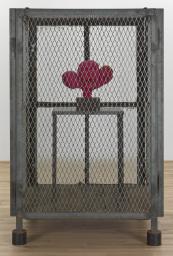
Next year will mark 50 years since the publication of Michel Foucault’s groundbreaking Surveiller et punir: Naissance de la prison. That was February 1975. Two reports issued this week concerning the state of prisons in France and in Scotland suggest that the “birth of prison” continues unabated to this day. While it’s not particularly surprising that prisons born of the will to knowledge expressed as a toxic mix of discipline and punishment, it still makes one wonder what our collective, and often individual, investments are in such an inhumane and cruel institution.
Today, the French section of the International Observatory of Prisons published Au coeur de la prison: La machine disciplinaire. According to the report, in 2022 almost half of incarcerated people were “the subjects of incident reports”, resulting in 69,174 “disciplinary sanctions”, including over 100,000 days in solitary confinement. Take a discrete population in a controlled space. Criminalize every action. Impose cruel and unusual punishments on at least half the population. Tell them it’s for their own good, for their “rehabilitation”. These are lessons they have to learn. And there you have it, a disciplinary machine: “In prison, the list of faults punishable by disciplinary sanctions is potentially infinite, referring to categories of behavior that are sufficiently vague to encourage arbitrariness, behind mentions of `protection of order’ or ‘normal functioning’ of the establishment.” In 2022, half the sanctions led to solitary confinement, often for as long as 30 days, in violation of European prison rules. What comes of rampant solitary confinement, “the heart of the disciplinary response”? High rates of self-harm and suicide, unsurprisingly. An example of the arbitrariness of the disciplinary machine: “The standards governing the clothing of women prisoners are stricter than those for men.” For incarcerated women, bared shoulders or visible knees can lead to solitary confinement.
Yesterday, the Scottish Centre for Crime and Justice released Nothing to see here? Deaths in custody and FAIs in Scotland – 2023, its third report on deaths in custody in Scotland. The Centre reports that four people die every week in Scotland while detained or under the control of the state. Between October 2022 and September 2023, 244 people died in state detention or care. Police contact deaths are increasing. Deaths have been increasing among those in mental health detention. Since the pandemic, deaths have been rising among those in migration detention and asylum “accommodation”. Deaths have been rising among looked after children and young people. Deaths among those held in prison “have been rising for many years, and this accelerated in the pandemic.” The death rate in prison in 2021-23 was 618 (per 100,000) compared to 242 in 2008-10. Between 30% and 50% were suicide and drug deaths. “Suicide and drug deaths in prison are increasing, and drug deaths are much higher in Scotland than in prisons in other places, including England and Wales, Australia and Europe.” More people sentenced to prison for longer terms have been committing suicide. Despite the rising numbers, most of the official documents refer to the deaths as “regrettable but inevitable”. Where are the women in this scenario? “The average age at death of … women who have died in prison since 2004 is 37 years; for men, the overall average since 2004 is 46.” Regrettable but inevitable.
Regrettable but inevitable is the theme for both reports. Create a disciplinary machine and what do you get? Regrettable but inevitable harm, often leading to death, within the prison or beyond, and not only for the incarcerated. Throw people into the hole and if they self-harm or kill themselves, it was regrettable but inevitable. The system had no part in that, there was no torture, there was no execution, there was only carceral agency. Build a structure where women “die” at an age nine years younger than that of men, and this in Scotland where the current life expectancy is 80.7 years for women, 76.5 years for men. So, women are “losing” 44 years, more than half an expected life span. Regrettable but inevitable.
Near the end of Discipline and Punish, Foucault wrote, “Is it surprising that the cellular prison, with its regular chronologies, forced labour, its authorities of surveillance and registration, its experts in normality, who continue and multiply the functions of the judge, should have become the modern instrument of penality? Is it surprising that prisons resemble factories, schools, barracks, hospitals, which all resemble prisons?” Fifty years later, so-called democracies are still committed to and investing in essentially the same prison system. Is it surprising? No, it’s regrettable and inevitable.
(By Dan Moshenberg)
(Image Credit: Louise Bourgeois, “Cell XIV (Portrait) / Tate)